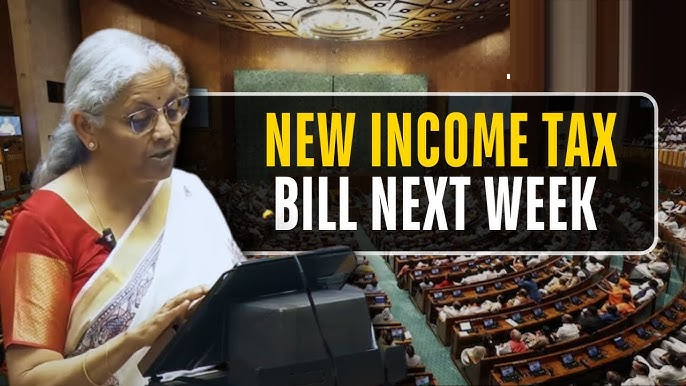New Tax Bill 2025: New Tax Bill will be introduced in Lok Sabha today. It was approved by the Union Cabinet led by PM Narendra Modi last week and after being introduced in Parliament, it will be sent to the Standing Committee for detailed discussion.
The budget session of Parliament is going on and today the government is going to introduce the new Income Tax Bill (New Income Tax Bill 2025) in the Lok Sabha, which will replace the Income Tax Act 1961. Many changes have been made in this bill which is being changed after 63 years, the information of which has come to the fore in the draft copy released on Wednesday before its introduction.
It has been claimed to make the Income Tax Act 2025 simpler, transparent and taxpayer-friendly than before. In this, it has been proposed to simplify the tax system from digitization, improvement in tax payment to making the rules more stringent regarding tax evasion. Let us know the 10 big things of this Income Tax Bill 2025, in 10 points…
1- The number of pages in the bill has reduced so much
The first and big change in the new Income Tax Bill is that it has been made somewhat concise with easier words than before for the common people to understand. Like the 1961 Income Tax Bill had 880 pages, but after six decades, the number of pages included in it has now been reduced to 622. The new tax bill has 536 sections and 23 chapters.
2- Concept of ‘Tax Year’
The concept of Tax Year has been introduced in the new bill to be presented today. Which will replace the assessment year and previous year used till now. It has usually been seen that while paying tax, taxpayers used to get confused about assessment and financial year, but now eliminating them, only tax year will be used. For example, the tax year from 1 April 2025 to 31 March 2026 will be 2025-26. This means that the entire 12 months of the financial year will now be called the tax year.
3- Standard deduction remains the same
Under the new tax bill, if you are a salaried person, you will continue to get a standard deduction of Rs 50,000 under the old tax regime, but if you choose the new tax regime, then this deduction will be available to you up to Rs 75,000. Along with this, there will be no change in the tax slab under the new tax regime and the rates announced in the budget will remain the same.
- No tax on income up to Rs 4 lakh
- 5% tax on Rs 4 lakh 1 to Rs 8 lakh
- 10% tax on Rs 8 lakh 1 to Rs 12 lakh
- 15% tax on Rs 12 lakh 1 to Rs 16 lakh
- 20% tax on Rs 16 lakh 1 to Rs 20 lakh
4- CBDT got this right
The next big change in the changes made in the New Tax Bill as compared to the Income Tax, 1961 is related to the Central Board of Direct Taxes i.e. CBDT. According to the bill, earlier the Income Tax Department had to contact the Parliament to start various tax schemes, but according to the New Tax Act 2025, now CBDT has been given the right to start such schemes independently. Its purpose is to eliminate the problem of bureaucratic delays.
5- Capital gain rates unchanged
There has been no change in the period of short term capital gain for the stock market in the draft. Under section 101 (b), a period of up to 12 months will be considered as short term capital gains. Apart from this, its rates have also been kept the same. Short term capital gain tax has been retained at 20 percent, while 12.5 percent tax will be applicable under long term capital gain.
6- Exemption on pension, NPS and insurance too
Under the new income tax bill, tax deduction on pension, NPS contribution and insurance will continue. Retirement fund, gratuity and PF contribution have also been kept under the purview of tax exemption. Tax relief will also be given on investment in ELSS mutual funds.
7- Penalty on tax evasion
The new tax bill has made provision for more strictness and penalty on tax evaders. Those who deliberately evade tax can be prosecuted. High interest and penalty can be charged for not paying tax. If a person tries to hide his income, his account can be seized. Apart from this, heavy penalty will be imposed for giving wrong or incomplete information.
8- E-KYC mandatory to make tax payment transparent
The central government aims to make the existing tax system digital and more transparent through the new tax bill. For this, e-KYC and online tax payment are being made mandatory. E-Filing being mandatory will increase transparency in tax payment.
9- Tax exemption on agricultural income
In the new tax bill, agricultural income has been kept tax-free under certain conditions. Tax exemption will be given on the amount given to religious trusts, institutions and donations. Along with this, electoral trusts have also been exempted from tax.
10- These changes to reduce tax disputes
Due to many unclear provisions in the 1961 Tax Bill, disputes have been seen between taxpayers and the government and due to these the number of litigations has also increased continuously. The New Tax Bill is being introduced with clear rules and easy words, which will make it easier to understand and also reduce the number of disputes.


